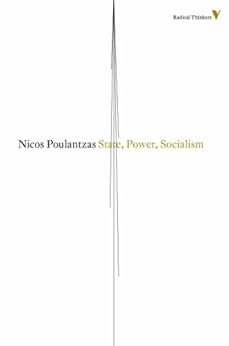 |
| Amazon link |
I finally completed Poulantzas's turgid, repetitive, over-abstract and slightly-dated book. Far from a page-turner. Yet really important for the final few chapters.
Poulantzas turns his educated, sophisticated Marxist eye on the problem of transition and the nature of the socialist state. Let me crudely summarise.
Poulantzas understands completely the Leninist model of 'soviet democracy': that is, a hierarchy of workers' councils running everything as the proletarian state. He understands that this doesn't work. It requires a mobilisation of the masses which cannot last indefinitely. It isn't an efficient decision-making mechanism due to the need for expertise. It cannot replicate the enormously complex and specialised functions and services undertaken by the bourgeois state apparatus, which would only increase after the supercession of capitalism.
His solution is a transformed and transforming bourgeois-like state apparatus (i.e. a state bureaucracy) kept on the straight and narrow by parallel popular structures. The interplay between these two loci of power is under-defined, and, as he himself point out, inevitably leads to existential conflict. It's unstable.
Really, Poulantzas sees no way out.
I would add that with actually-existing humanity, both bureaucratic structures and a hierarchy of councils invariably ossify into self-serving elites which stagnate as they succumb to the principal-agent problem.
Altruism meets its limit in Dunbar's number.
How does capitalism avoid these problems? Poulantzas correctly observes that the state is not a dominant participant in the relations of production, which are those of privately ownership of the means and objects of production. A hegemonic bourgeoisie tolerates nationalisation only in the event of market failure.
We can additionally note that the only thing which keeps social agencies competent and innovatory is competition. The fear of losing everything saves a structure from complacent featherbedding and elite-capture. Remove competition and things slow to an ossified crawl and the tyranny of the elites is assured.
And so the destruction of the capitalist mode of production and its replacement by central planning leads to Stalinism. This is Poulantzas's compelling (and unwanted) conclusion.
---
 |
| Amazon link |
I'm debating getting this. I read the intro, where Žižek seems to share Poulantzas's general conclusions, but seems to have reverted to a strategy which Poulantzas correctly rejects: the encirclement of global imperialism by municipal, localised, counter-initiatives.
This has been a popular, albeit minority view in the Left: I wrote about Paul Mason's similar views. A counter to reformist social-democracy, a paradigm in worldwide collapse.
Utterly unconvincing of course.
Žižek gets brownie points for taking notice of the scientific advances in psychometrics, behavioural genetics and the like (cf. Plomin). Most writers in the Marxist tradition have taken the intellectually-suicidal route of turning their blind eyes to this and retaining a touching faith in blank-slatism verging on vitalism.
Žižek has little idea, however, as to how to integrate these new understandings of human nature into the traditional Marxist world-view. But in the longer term (which will still be co-extensive with the reign of capital) humanity will be as labile as any other innovating technological factor.
A society of clones could make communism - as anticipated by the founders - work, at least for a while. It is the only possible genetic underpinning of the perfect altruism required. Such a solution is, of course, genetically unstable. Utterly at the mercy of defection-mutations (if they are not ruthlessly suppressed). Oh, and evolution doesn't much like clone-species - too brittle with zero population variation.
It's imaginable that capitalist dynamism could be combined with a greater propensity to income-equality and tolerance of transfer payments. But I don't think we could take it too far, a kind of über-Denmark. The psychological attributes which make capitalism - red in tooth and claw - work seem incompatible with excessive hand-wringing liberalism. Ask Justin Trudeau.
No comments:
Post a Comment
Comments are moderated. Keep it polite and no gratuitous links to your business website - we're not a billboard here.